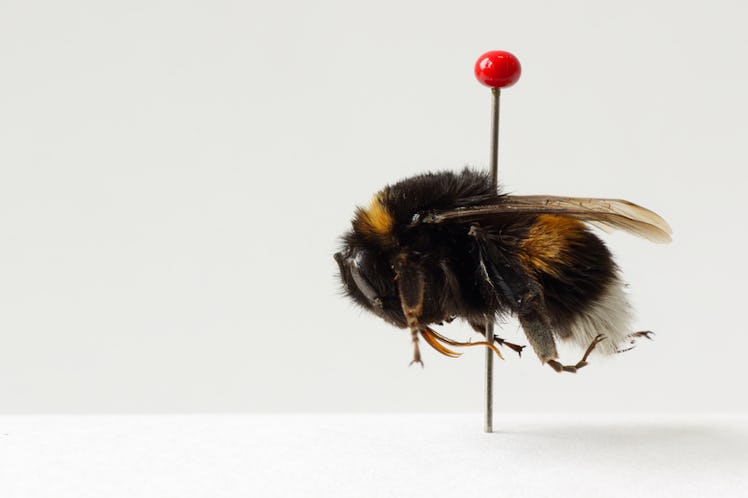
A Woman Lost Her Life After Getting "Bee Acupuncture" & It's Heartbreaking
If you think you've tried every eccentric health treatment out there, you might want to think again, because there's a procedure called bee acupuncture, and it's basically exactly what it sounds like. Bee acupuncture, also called apitherapy, is getting serious attention on the internet this week for the most heartbreaking reason: A 55-year-old woman in Spain, whose name has not been identified, lost her life after receiving the treatment, The Washington Post reports. Now, people are wondering just how safe bee acupuncture really is, and what it's supposed to even do for you in the first place.
According to CNN, apitherapy is the medicinal use of bee hive products, such as venom, honey, and pollen, as a strategy to relieve pain or otherwise help various medical conditions. Here's how it works: In live bee sting acupuncture, you swap out acupuncture needles for — you guessed it — live bees, which sting your body in localized areas as an antidote for chronic pain conditions, as well as muscular soreness and stress.
The Journal of Investigational Allergology and Clinical Immunology reports that the woman who passed away from the acupuncture session was not allergic to bees prior to the treatment, and had actually been receiving this exact type of acupuncture on a regular basis.
She apparently developed a tolerance to the bee stings for all prior sessions, but suddenly, she had an unexpected, and ultimately fatal allergic reaction, the Spanish medical journal reports.
The woman's allergic reaction led to such a startling drop in her heart rate, according to the medical journal, that she soon entered a coma, from which she unfortunately never woke up. The researchers wrote,
To our knowledge, this is the first reported case of death by bee venom apitherapy due to complications of severe anaphylaxis in a confirmed sensitized patient who was previously tolerant.
According to Dr. Thomas Casale, a professor of medicine at the University of South Florida who spoke to CNN about this case study (but was not directly involved in it), it's important to understand that allergic reactions to a bee sting can take place even if you've never had an allergy to bees before. He noted,
Severe allergic reactions to insect stings can develop at any age, often following a number of uneventful stings.
In other words, even if you don't think you're allergic to bees, you still have the potential to have an allergic reaction to a sting at any point in your life.
For this reason, you definitely want to make sure you talk to both a doctor, and the person who will administer the live bee acupuncture, if you still want to try it.
Apitherapy is still regarded by some to serve a wide variety of medicinal purposes, according to the American Apitherapy Society, including neurological problems, infectious problems, traumas, and burns. However, it's just as important to acknowledge the conclusion that the researchers on this particular case study came to, after witnessing what happened to the woman in Spain. They wrote in the study,
...the risks of undergoing apitherapy may exceed the presumed benefits, leading us to conclude that this practice is both unsafe and unadvisable.
If apitherapy really is something you're still interested in trying, know that you are going into a treatment that appears to have a lot of risks associated with it, so make sure you're educated on the topic, and that you do it at a location that is prepared to assist you quickly in the event of a sudden allergic reaction.
For what it's worth, there are other ways to reap the benefits of the treatment outside of live bee acupuncture, including ingestion of pollen and the use of essential oils. You can get more information about apitherapy on the American Apitherapy Association's website.